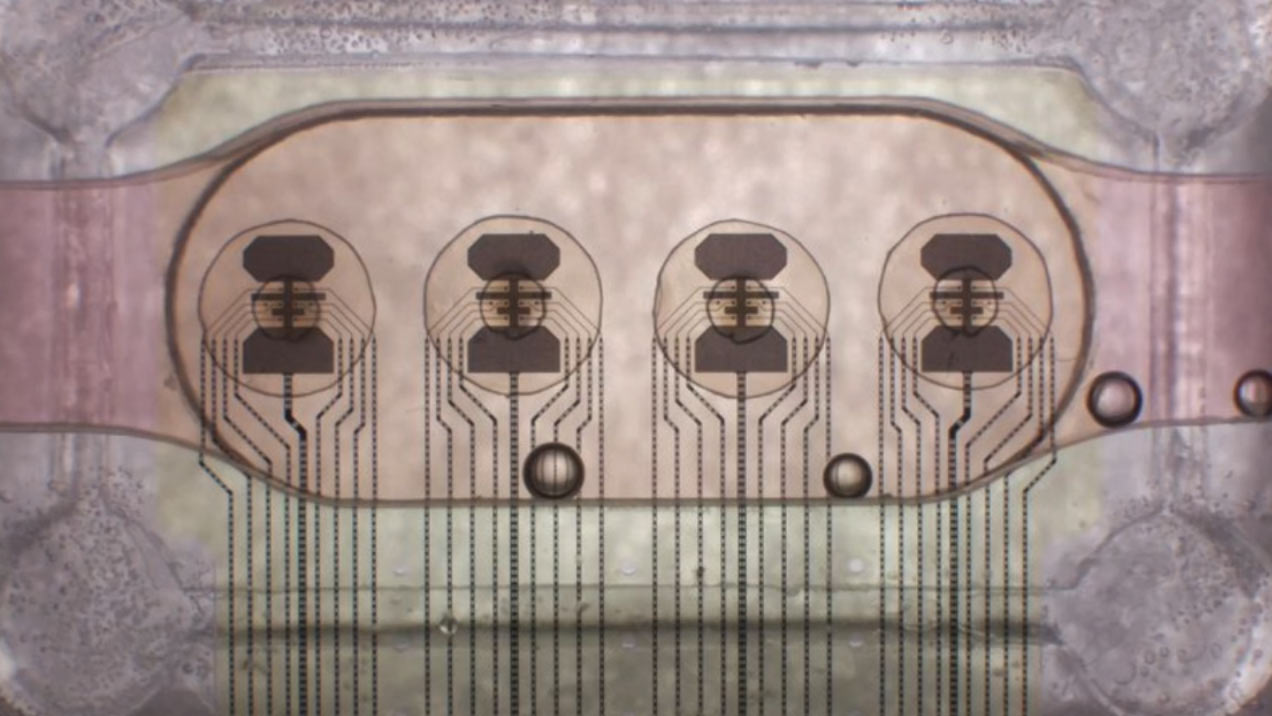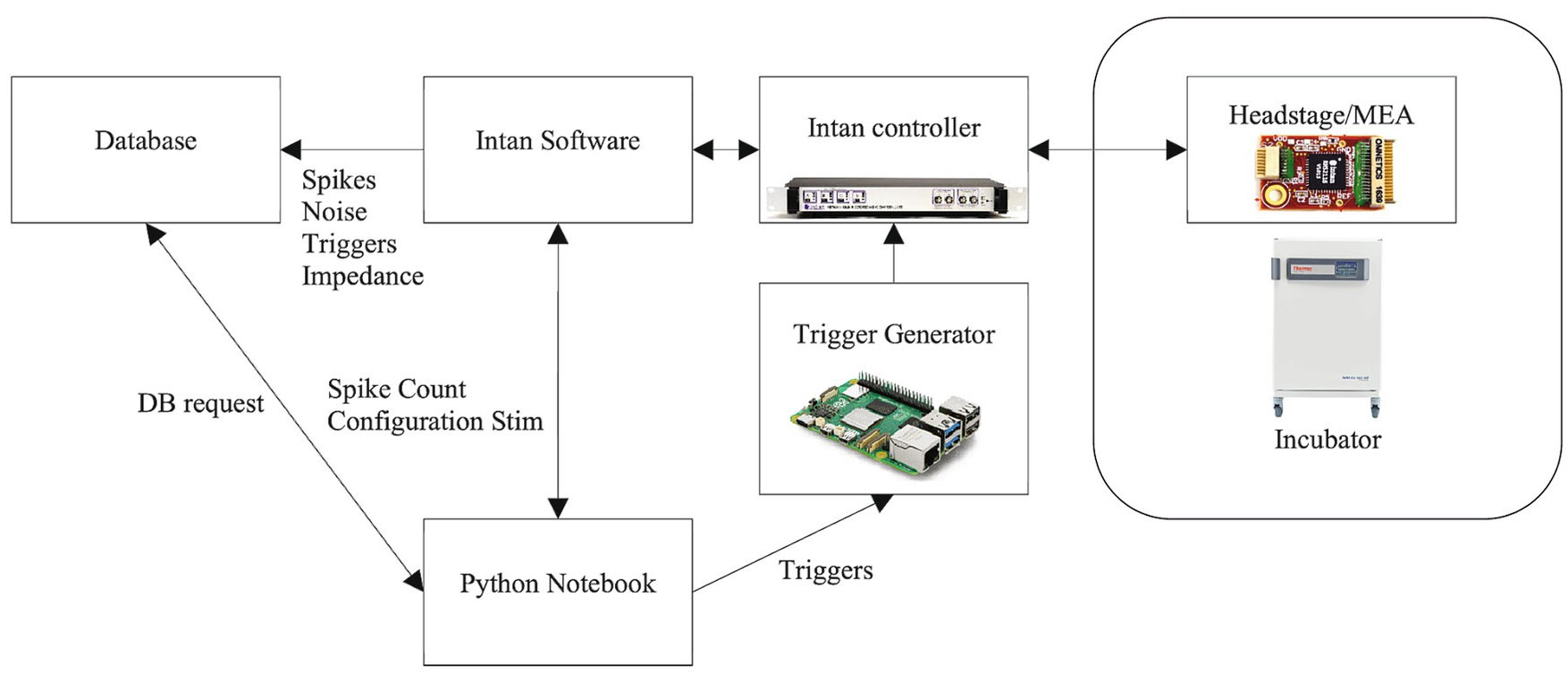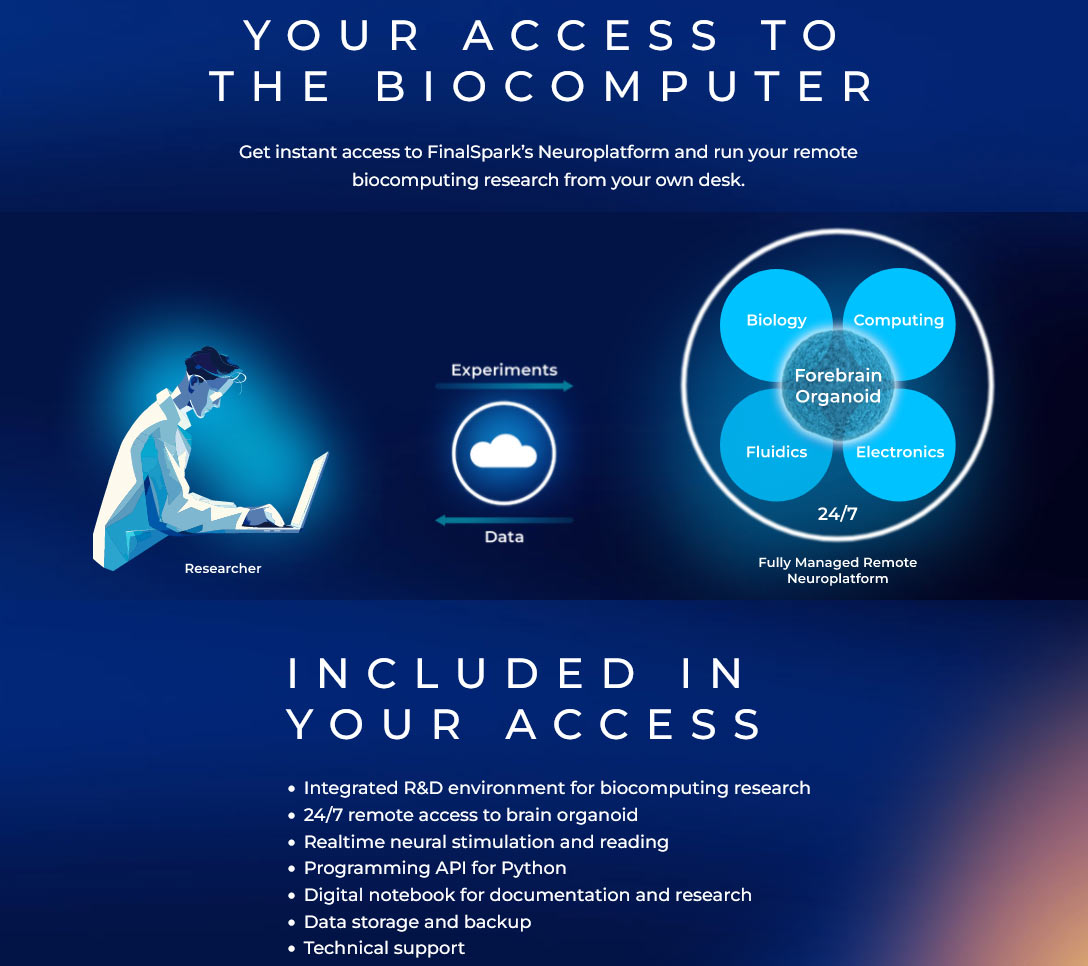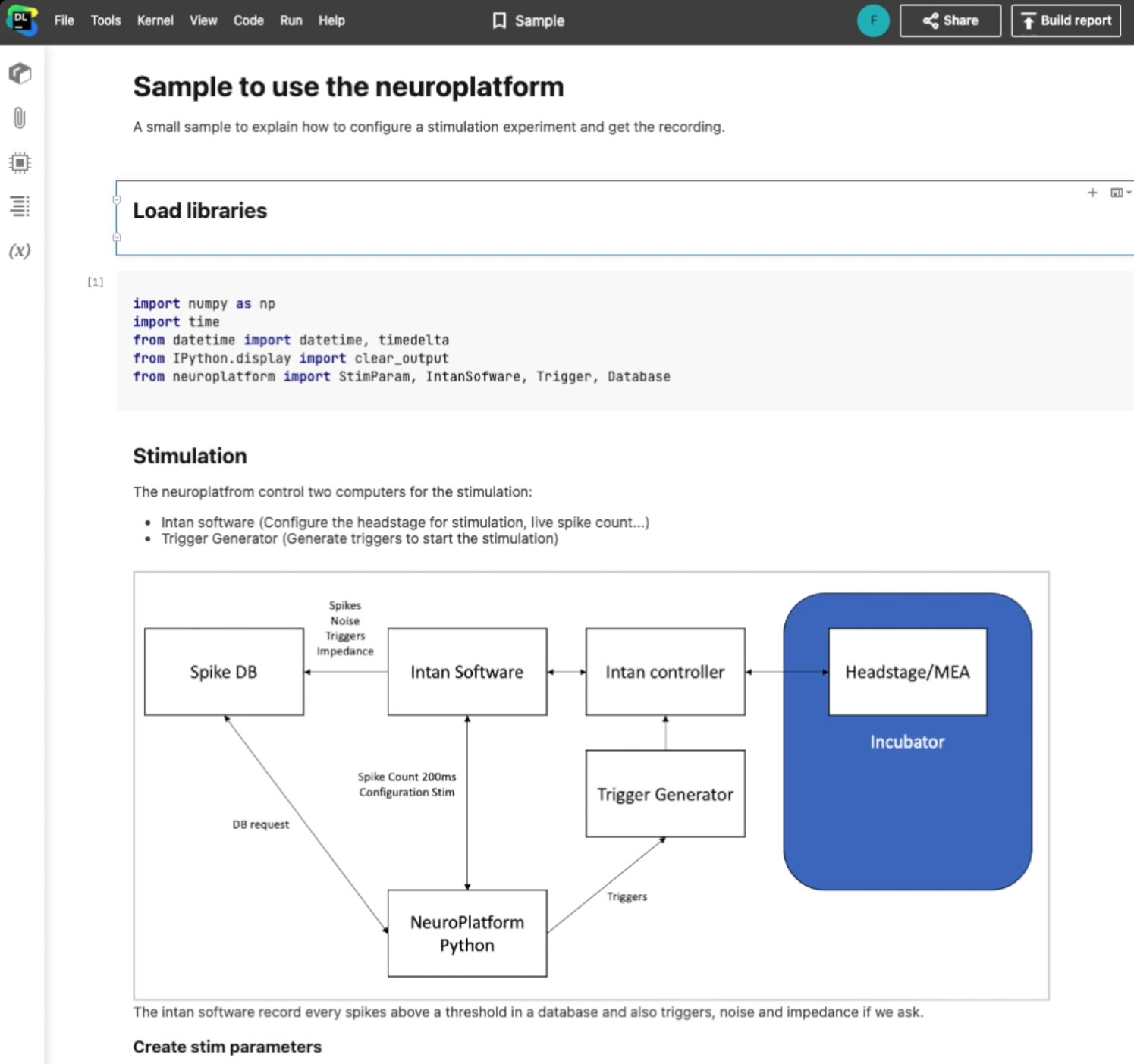World's first bioprocessor uses 16 human brain organoids for ‘a million times less power’ consumption than a digital chip
Swiss startup claims its Neuroplatform is a first for biocomputing.

A Swiss biocomputing startup has launched an online platform that provides remote access to 16 human brain organoids. FinalSpark claims its Neuroplatform is the world’s first online platform delivering access to biological neurons in vitro. Moreover, bioprocessors like this “consume a million times less power than traditional digital processors,” the company says.
FinalSpark says its Neuroplatform is capable of learning and processing information, and due to its low power consumption, it could reduce the environmental impacts of computing. In a recent research paper about its developments, FinalSpakr claims that training a single LLM like GPT-3 required approximately 10GWh – about 6,000 times greater energy consumption than the average European citizen uses in a whole year. Such energy expenditure could be massively cut following the successful deployment of bioprocessors.
The operation of the Neuroplatform currently relies on an architecture that can be classified as wetware: the mixing of hardware, software, and biology. The main innovation delivered by the Neuroplatform is through the use of four Multi-Electrode Arrays (MEAs) housing the living tissue – organoids, which are 3D cell masses of brain tissue.
Each MEA holds four organoids, interfaced by eight electrodes used for both stimulation and recording. Data goes to-and-fro via digital analog converters (Intan RHS 32 controller) with a 30kHz sampling frequency and a 16-bit resolution. These key architectural design features are supported by a microfluidic life support system for the MEAs, and monitoring cameras. Last but not least, a software stack allows researchers to input data variables, and then read and interpret processor output.



FinalSpark has given access to its remote computing platform to nine institutions to help spur bioprocessing research and development. With such institutions' collaboration, it hopes to create the world’s first living processor. Also, there are already three dozen universities interested in Neuroplatform access.
To access the Neuroplatform, educational institutions are asked to subscribe for $500pcm for each user.
Biological processor organoids 'live' about 100 days
Silicon chips can last years, sometimes decades. The neuronal structures that form bioprocessors are also said to have a long lifespan, but are only “suitable for experiments that run for several months,” says FinalSpark. Initially, the firm’s MEAs would only last a few hours, but refinements to the system mean an organoid lifespan is currently expected to be around 100 days.
Get Tom's Hardware's best news and in-depth reviews, straight to your inbox.

Mark Tyson is a news editor at Tom's Hardware. He enjoys covering the full breadth of PC tech; from business and semiconductor design to products approaching the edge of reason.
-
ezst036 Would it be configured either in x86 or ARM compatibility?Reply
Admin said:FinalSpark says its Neuroplatform is capable of learning and processing information, and due to its low power consumption could reduce the environmental impacts of computing
Yeah, right. Being biological, what is the requirement around refrigeration? How much power does that use?
Data centers also consume far far less power when you omit the cost of their refrigeration needs as well. -
vijosef Transistors can also use orders of magnitude less power, but at lower speeds. Organoids cannot do billions of calculations per second.Reply -
bit_user I'm sure this is a breakthrough for people doing brain research or work on prosthetics and brain-machine interfaces. For other applications, I'm skeptical.Reply
I mean, let's say you can train it to do some tasks comparable to how deep learning is being used. Okay, what then? You can't scale up inferencing, by replicating the trained network. And after its couple month lifespan is up, you have to start over and train up a new one. Plus, do you have to give it time to rest? Does it forget things over time?
I really think the article is taking this somewhat out of context. -
bit_user Reply
If you model the computational processes being performed by brains and nervous systems, they are indeed quite a bit more efficient than digital computers running at any speed. Obviously, if what you need is to perform highly accurate & precise computations, neural networks of any kind are a poor tool for the job.vijosef said:Transistors can also use orders of magnitude less power, but at lower speeds. Organoids cannot do billions of calculations per second.
Though I thoroughly enjoyed the original movie, it was written by people with a poor grasp on science. In their vision, the machines were using humans as a biological power source and the point of The Matrix was basically to keep us from dying of boredom... or something like that. For such a cool movie, you'd think they could've done a little more work on the premise, but times were different and most movies made very little effort to getting the basics of science & technology right. Anyway, I somehow managed to watch the movie without even picking up on that detail, so it didn't ruin it for me.CmdrShepard said:Matrix was a warning, not an instruction manual damn it. -
usertests Reply
I think this startup is an attempt to scale up and productize something that has been around for over 20 years now:bit_user said:I'm sure this is a breakthrough for people doing brain research or work on prosthetics and brain-machine interfaces. For other applications, I'm skeptical.
I mean, let's say you can train it to do some tasks comparable to how deep learning is being used. Okay, what then? You can't scale up inferencing, by replicating the trained network. And after its couple month lifespan is up, you have to start over and train up a new one. Plus, do you have to give it time to rest? Does it forget things over time?
https://en.wikipedia.org/wiki/Hybrot
Brain organoid chips are already a brain-computer interface. I say connect it to a digital computer/coprocessor that does the hard calculations, if that's needed for the application.bit_user said:If you model the computational processes being performed by brains and nervous systems, they are indeed quite a bit more efficient than digital computers running at any speed. Obviously, if what you need is to perform highly accurate & precise computations, neural networks of any kind are a poor tool for the job.
It could be similar to what people want brain implants to be (beyond helping quadriplegics): you think of a math problem or look at a complex problem on a whiteboard, it's solved instantly and the answer is reported back to you. It's also like the subdivision of labor we see in SoCs. CPU, GPU, NPU (matrix math accelerator). Why not add quantum and neuromorphic coprocessors?
As for how useful this type of living/dying coprocessor could be, it could become a shortcut to strong AI. You can understand how a brain works in order to replicate its functions in silicon, or you can bypass understanding and grow a highly connected brain in a vat. These organoids are tiny and simple compared to a human brain, but it may be possible to eventually scale it up to create an interconnected system that's larger and more powerful than the brain of any animal that has ever existed. Or likely to exist due to biological limitations. -
TerryLaze Reply
These will be more like quantum computers in what they will be used for and can actually process. Completely different from x86 and or arm.ezst036 said:Would it be configured either in x86 or ARM compatibility?
Yeah, right. Being biological, what is the requirement around refrigeration? How much power does that use?
Data centers also consume far far less power when you omit the cost of their refrigeration needs as well.
And I can see them using a million times less power than a similar quantum computer.
Also how do you keep your head in freezing conditions to keep your brain cells working?! Why would they use refrigeration? Brain, and all types of cells, work slower the cooler they are. Maybe they will have a bunch of cells prepared and in storage in case the ones they use wear out or whatever but that's not gonna be more expensive than your freezer at home.
The machines had to keep the human brains from figuring out that there was anything wrong because that lead into the human bodies rejecting the implants resulting in the loss of entire crops.bit_user said:and the point of The Matrix was basically to keep us from dying of boredom... or something like that. For such a cool movie, you'd think they could've done a little more work on the premise,
"Did you know that the first Matrix was designed to be a perfect human world? Where none suffered, where everyone would be happy. It was a disaster. No one would accept the program. Entire crops were lost. "
"The perfect world was a dream that your primitive cerebrum kept trying to wake up from. Which is why the Matrix was redesigned to this: the peak of your civilization." -
Silas Sanchez Reply
The problem of quantum computers is the same old problem i already knew about back in high school, in order to deal with the problem of decoherence you need a huge amount of engineering and power consumption. They keep telling us about error correction but that just adds to the complexity/energy requirements becoming a disaster. perhaps limited to big firms and gov, but the nature of QC is such that its a lousy tool for general computing and is more suited for solving specfic problems.usertests said:Why not add quantum and neuromorphic coprocessors?
As for how useful this type of living/dying coprocessor could be, it could become a shortcut to strong AI. You can understand how a brain works in order to replicate its functions in silicon, or you can bypass understanding and grow a highly connected brain in a vat. These organoids are tiny and simple compared to a human brain, but it may be possible to eventually scale it up to create an interconnected system that's larger and more powerful than the brain of any animal that has ever existed. Or likely to exist due to biological limitations.
Strong AI is really two things, its original specific definition had to do with the problem of how meaning/understanding could possibly arise from manipulating symbols (syntax), the argument being that there was no conceivable way this could happen. It was eventually directed towards the computational theory of mind-that human reasoning is at its core the processing and manipulating of symbols. But the definition was a gross simplification as its very narrow.
At its extreme-whether a machine could truly have a mind, is so far from pure speculation. There is really no consensus on whether the idea is sound or not-given the huge variety of ways to go about it and our severe lack of understanding on our own mind, whether there are other forms of a mind-even within ourselves or other objects/systems. Remember, consciousnesses is a huge mystery that science most likely wont ever solve, how something as apparently lifeless as flesh and chemical & electrical signals give rise to something so vivid and hard to define. I never did buy the whole 'neaurocorreltaes of consciousness' fantasy. Strong AI is part of the problem of other minds & the hard problem of consciousnesses applied to machines. It's completley 100% safe from ever being probed.
The idea that all we have to do is make a computer powerful and complex enough and it will have a mind like ours or even similar is one of the fatal intuitions entricnhed in society. You put a face on an andriod, and wow! Perhaps now we should consider if its possible that it has a mind.
They say AI researchers are not concerned about strong AI, just that it works.
But there would have to no doubt be ethical issues, even with this awful thing we can "AI", its already doing massive damage to society.
Its often said the best chance of a digital computer having a mind is simply by simulating the human brain, neuron for neuron and have sensory inputs to it so it grows up and learns in the world. But again, ethics... -
cyrusfox Reply
In the original script the humans were actually used for computation, they change it to a power source in the movie(think to simplify it for audiences), but the original script was closer to your original point, that being we are actually very efficient "Machines" Reddit link saying as much, simpler post to the point)bit_user said:Though I thoroughly enjoyed the original movie, it was written by people with a poor grasp on science. In their vision, the machines were using humans as a biological power source and the point of The Matrix was basically to keep us from dying of boredom... or something like that. For such a cool movie, you'd think they could've done a little more work on the premise, but times were different and most movies made very little effort to getting the basics of science & technology right. Anyway, I somehow managed to watch the movie without even picking up on that detail, so it didn't ruin it for me.
